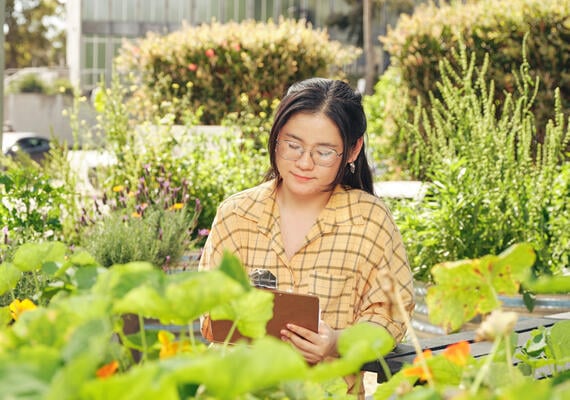
Upskill with an Australian-first course
Study at the innovative Deakin Waterfront Campus in Geelong, Australia's first and only UNESCO designated City of Design. Apply now to start studying in Trimester 2, 2024.
Today, more than half the world’s population live in cities and by 2050 an estimated 7 out of 10 people will likely live in urban areas.* What effects does this rapid growth have on the environment?
Cities demand almost two-thirds of global energy, producing up to 80% of greenhouse gas emissions and 50% of global waste. This creates a need for jobs that contribute to environmental preservation and support the transition to more sustainable cities.
If you’re passionate about a career in building a sustainable future, a design for circular cities postgraduate course at Deakin could be for you – the first of their kind in Australia.
A circular economic model can help solve the environmental challenges created by our built environment – water, waste and power systems, transport infrastructure and the buildings we live and work in.
A circular city focuses on the design and implementation of urban environments that prioritise sustainable design.
In a well-designed circular city, everything operates in an interconnected network of systems to cut waste, eliminate pollution, recycle materials and regenerate nature. The city's energy needs are entirely met by renewable sources.
Citizens, governmental bodies, research institutions and businesses work together to create a city that is regenerative, resilient and environmentally friendly.
Looking for a career change or to upskill? Consider joining the booming circular economy industry. Built environment has been identified by the Australian Government as a priority sector in the transition to a circular economy. Plus, the sector currently employs 1.2 million people in Australia and accounts for 9% of GDP.
Deakin’s design for circular cities courses are the first of their kind in Australia, applying design thinking and research methods to real-world problems, including addressing waste, recycling and pollution.
‘Students will master circular economy principles applied to urban development, gain practical skills in sustainable urban design, and learn system/design thinking skills for crafting innovative solutions,’ says course director Professor Tuba Kocaturk.
‘These comprehensive learning outcomes ensure graduates are well-equipped to drive and support the transition to resilient and sustainable urban spaces.’

Study at the innovative Deakin Waterfront Campus in Geelong, Australia's first and only UNESCO designated City of Design. Apply now to start studying in Trimester 2, 2024.
A 2023 report by Deakin University and industry experts highlights the top three enablers for a circular economy; research and development of enabling technologies, education of stakeholders, and evidence of the circular economy’s added value.
Our industry-led courses aim to respond to these enablers, so you’ll graduate equipped with the knowledge and skills to lead significant, multidimensional changes towards sustainability in urban environments.
The course will facilitate the training of next-generation thought leaders in urban design, planning, management, policy and economy through the lens of how good design can optimise essential environmental outcomes for development in our cities.
Professor Tuba Kocaturk
Professor of Circular Cities
Currently studying an undergraduate degree? You can apply to enter a design for circular cities course from any discipline.
These unrivalled new courses are truly interdisciplinary, bringing together elements of science, design, architecture, engineering, planning, business and more.
The expertise you gain, alongside your knowledge in an undergraduate area of study, will enable you to influence a more sustainable future and create resilient communities.
Industry connections are pivotal; leverage Deakin’s strong industry links to gain an industry perspective on circularity in practice. You’ll learn by doing, through participation in joint projects with our UNESCO Cities of Design international network.
‘Deakin’s collaboration with circular cities globally provides students with access to a vast knowledge base and international collaborators, enhancing their learning experience and global perspective,’ says course director Professor Paul Sanders.
‘Additionally, students will have access to world-class facilities, collaborative workspaces and extensive digital resources to facilitate cutting-edge research and innovation.’
The skills you develop will unlock diverse career paths in urban and regional planning, urban design, sustainability consultancy, policy development, academia and more. You’ll graduate ready to influence sustainable urban development and contribute to the evolution of cities towards circular economies.
Ready for a new career in the green economy? Deakin’s circular cities courses are currently accepting applications for commencement in Trimester 2, 2024.
*The Sustainable Development Goals Report 2022